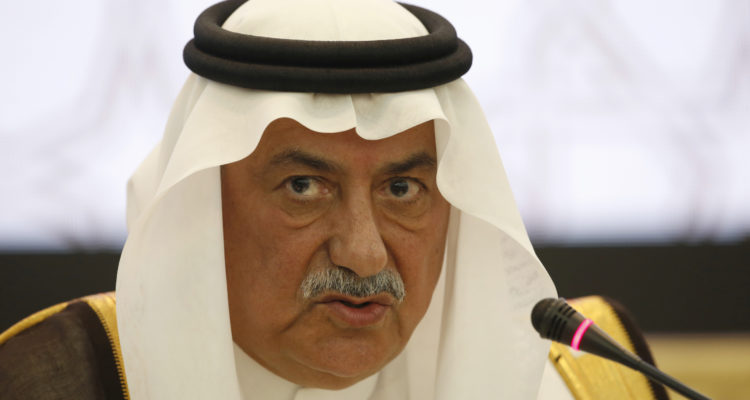Ibrahim al-Assaf made the comments at a meeting of foreign ministers of the 57-nation Organization of Islamic Cooperation.
By Associated Press
Saudi Arabia’s foreign minister on Thursday urged Muslim nations to confront recent attacks in the region that the U.S. and its allies have blamed on Iran with “all means of force and firmness.”
Ibrahim al-Assaf made the comments at a meeting of foreign ministers of the 57-nation Organization of Islamic Cooperation ahead of a series of summits in the kingdom beginning Thursday.
Al-Assaf said the alleged sabotage of boats off the coast of the United Arab Emirates and a drone attack on a Saudi oil pipeline by Yemen’s Iranian-backed Houthi rebels require the region to “make more efforts to counter the terrorist acts of extremist and terrorist groups.”
“We should confront it with all means of force and firmness,” al-Assaf said.
Iran has denied being involved in the attacks, which come amid heightened tensions between Tehran and the U.S. An Iranian official was at the meeting where al-Assaf spoke on Thursday, but Iranian Foreign Minister Mohammad Javad Zarif did not attend.
The U.S. has accused Tehran of being behind the string of incidents this month, which also included a rocket strike near the U.S. Embassy in Baghdad.
On Wednesday, U.S. national security adviser John Bolton told journalists in Abu Dhabi that there had been a previously unknown attempt to attack the Saudi oil port of Yanbu as well, which he also blamed on Iran.
Bolton described Tehran’s decision to back away from its 2015 atomic deal with world powers as evidence it sought nuclear weapons, even though it came a year after America unilaterally withdrew from the unraveling agreement.
He also stressed the U.S. had not seen any further Iranian attacks in the time since, something he attributed to the subsequent military deployments — America recently sent an aircraft carrier and B-52 bombers to the Persian Gulf. But Bolton warned the U.S. would strike back if again attacked.
“The point is to make it very clear to Iran and its surrogates that these kinds of action risk a very strong response from the United States,” Bolton threatened, without elaborating.
Meanwhile, on Wednesday, acting U.S. Defense Secretary Patrick Shanahan said some 900 troops coming to the Mideast over the perceived Iran threat — to reinforce the tens of thousands already in the region — would be deployed in Saudi Arabia and Qatar. Another 600 attached to a Patriot missile battery have had their deployment in the region extended.
“The Iranian threat to our forces in the region remains,” Shanahan said.
Bolton’s trip to the UAE comes just days after President Donald Trump, speaking in Tokyo, appeared to welcome negotiations with Iran.
“We’re not looking for regime change — I just want to make that clear,” Trump said. “We’re looking for no nuclear weapons.”
But Bolton himself, for years before becoming national security adviser, had called for overthrowing Iran’s government, both in interviews and in a paid speaking engagement before an Iranian exile group.
“I don’t back away from any of it. Those are positions I took as a private citizen,” Bolton said when asked about his prior remarks. “Right now I’m a government official. I advise the president. I’m the national security adviser, not the national security decision-maker. It’s up to him to make those decisions.”





